Traditions in Greece——Traditional festivals
Customs and traditions in Greece and the Greek Islands are an important aspect of the Greek culture. There are either of a religious character or coming from paganism. Furthermore, most of the traditions and festivals still celebrated today are religious.
The Greeks are very superstitious and believe a lot in religion but also in supernatural or paranormal phenomenon. Traditions and superstitions vary from island to island, from villages to villages and from region to region.
You will find below the many Greek traditions still honored in Greek modern culture, no matter people's age, until today.
We provide below information about traditional festivities (Name day celebration, Engagement, Carnival, Clean Monday, Easter, Greek Independence Day, The Ohi Day) and Superstitions (the Evil Eye (Mati), Spitting, Black cat, Hobgoblins, Tuesday the 13th, The expression Piase Kokkino)
Traditional festivals
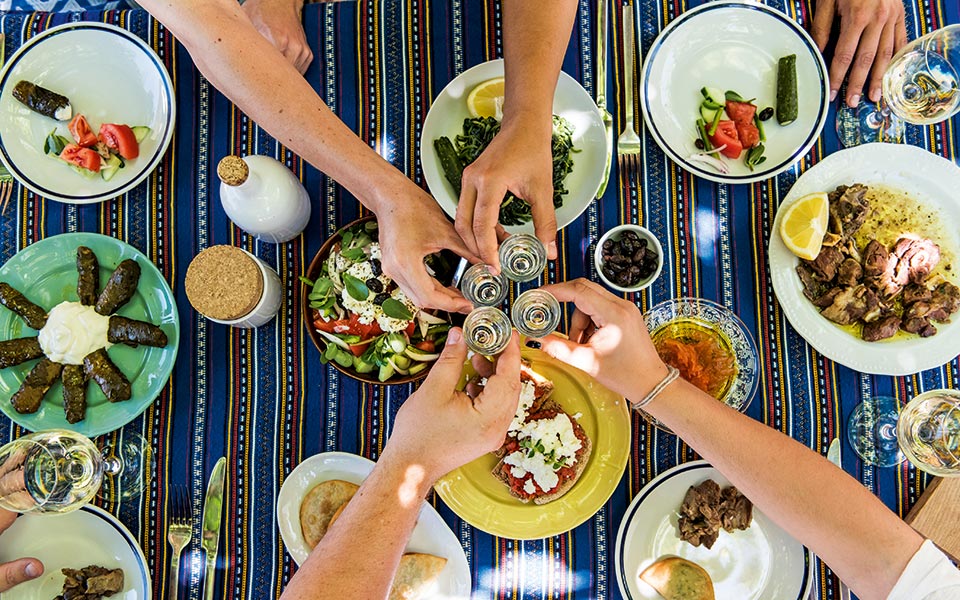
Name day celebration
Most Greeks are named after a religious saint. A very important tradition is that everyone who has a name coming from a saint celebrated by the church celebrates his name on a given day of the year. On the "name day" of someone, his friends and family visit him without invitation and offer wishes and small presents. The hostess of the house offers pastries, sweets and hors d'oeuvres to the guests. In Greece, name days are more important than birthdays.
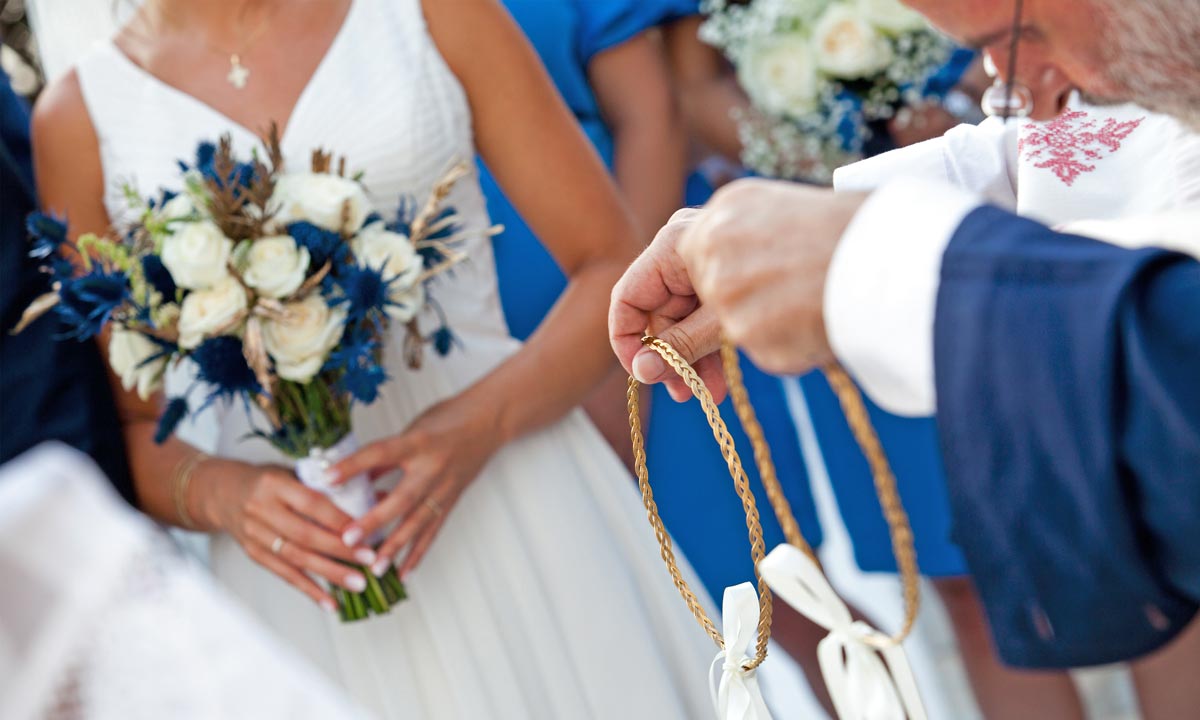
Engagement
It is a custom in Greece to get engaged before getting married. The man has to ask for the hand of the woman from her father and close family, while the two families give presents to the bride and groom. The couple exchanges wedding rings that are worn on the left hand. After the wedding, these rings will be worn on the right hand. In Greece, the engagement period may last for years and it is like a commitment to the families. This custom is still vivid in the Greek mainland and the islands, while gradually it tends to disappear.
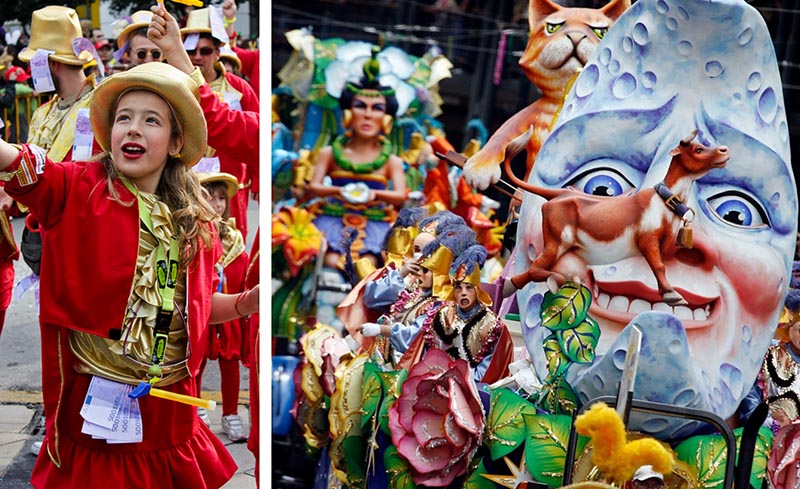
Carnival
In Greece, the Carnival is called "Apokries". The festival consists of two weeks of the feast, beginning from the Sunday of Meat Fare and ends with the first day of the Lent, called Clean Monday (Kathari Deutera). Everyone is costumed and parties take place in the streets and bars, throwing colored confetti to each other. The most famous Carnival Parade takes place in the city of Patra. In many towns around Greece and in the islands, local customs revive. The Carnival is believed to come from paganism, and more precisely from the old festivities worshipping Dionysus, the god of wine and feast.

Clean Monday
Clean Monday or Lent Monday is the first day of the Lent (Saracosti) during which families go for a picnic in the countryside and fly kites.
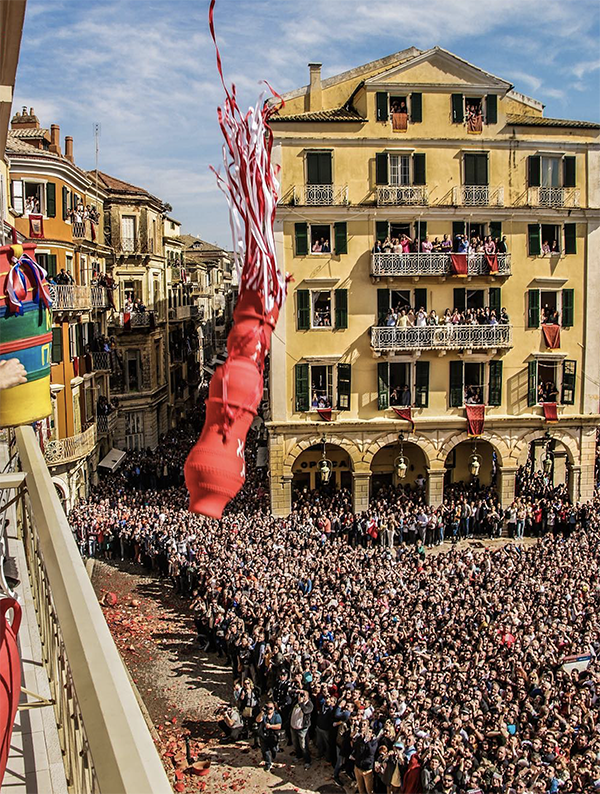
Easter
Easter is the most important celebration for the Greeks, even more than Christmas. On Good Thursday or Good Saturday, women dye eggs in red and bake buns. On Good Friday, the day of mourning, the Epitaphios, the tomb of Christ with its icon, decorated with flowers, is taken out of the church and carried around the village followed by a slow procession. After the procession returns to the church where the believers kiss the image of the Christ.
During the night of the Holy Saturday (Megalo Savato), everybody dresses well and goes to the church where a ceremony is held. Just before midnight, all of the lights of the church are turned off, symbolizing the darkness and silent of the tomb, while the priest lights a candle from the Eternal Flame, sings the psalm Christos Anesti (meaning Christ has risen) and offers the flame to light the candles of the people. Everyone passes the flame one to another. The bells ring continuously and people throw fireworks. The Good Saturday Dinner takes place after midnight and consists of mayiritsa, tsoureki (Easter cake) and red eggs. On Easter Sunday, the family roasts the lamb on the spit.
Corfu island is the most famous place for Easter.
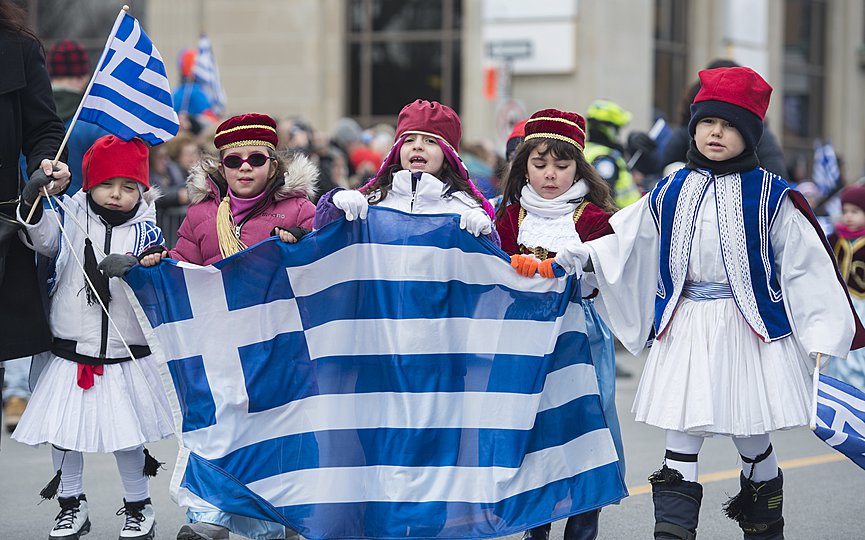
Greek Independence Day
The Greek Independence Day is celebrating the declaration of the Independence War against the Ottomans on March 25th, 1821. Apart from a national celebration, this day is also a religious celebration dedicated to the Annunciation of the Virgin Mary.
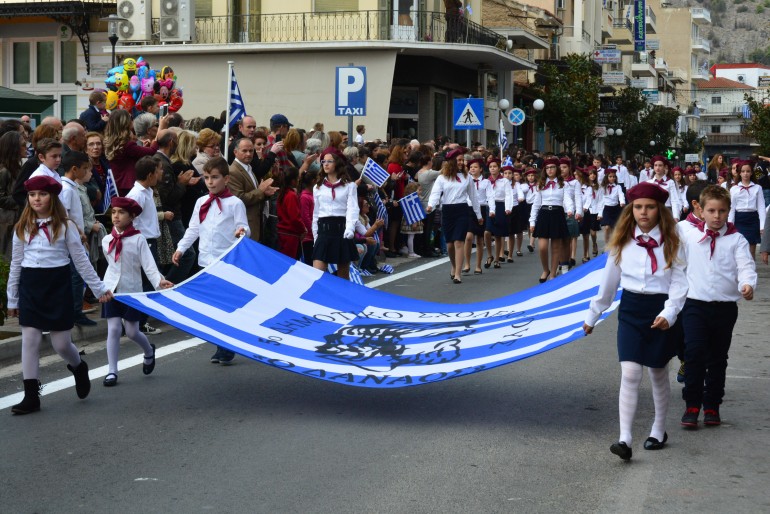
The Ohi Day
On October 28th, the Greeks celebrate the day when the Greek dictator Metaxas refused to let the Italians invaded the country during World War II. It is the celebration of the heroic OXI (NO): most Greeks put a Greek flag on their windows and balconies, while a parade takes place with the participation of school students and the army.
The Greeks are very superstitious and believe a lot in religion but also in supernatural or paranormal phenomenon. Traditions and superstitions vary from island to island, from villages to villages and from region to region.
You will find below the many Greek traditions still honored in Greek modern culture, no matter people's age, until today.
We provide below information about traditional festivities (Name day celebration, Engagement, Carnival, Clean Monday, Easter, Greek Independence Day, The Ohi Day) and Superstitions (the Evil Eye (Mati), Spitting, Black cat, Hobgoblins, Tuesday the 13th, The expression Piase Kokkino)
Traditional festivals

Name day celebration
Most Greeks are named after a religious saint. A very important tradition is that everyone who has a name coming from a saint celebrated by the church celebrates his name on a given day of the year. On the "name day" of someone, his friends and family visit him without invitation and offer wishes and small presents. The hostess of the house offers pastries, sweets and hors d'oeuvres to the guests. In Greece, name days are more important than birthdays.

Engagement
It is a custom in Greece to get engaged before getting married. The man has to ask for the hand of the woman from her father and close family, while the two families give presents to the bride and groom. The couple exchanges wedding rings that are worn on the left hand. After the wedding, these rings will be worn on the right hand. In Greece, the engagement period may last for years and it is like a commitment to the families. This custom is still vivid in the Greek mainland and the islands, while gradually it tends to disappear.

Carnival
In Greece, the Carnival is called "Apokries". The festival consists of two weeks of the feast, beginning from the Sunday of Meat Fare and ends with the first day of the Lent, called Clean Monday (Kathari Deutera). Everyone is costumed and parties take place in the streets and bars, throwing colored confetti to each other. The most famous Carnival Parade takes place in the city of Patra. In many towns around Greece and in the islands, local customs revive. The Carnival is believed to come from paganism, and more precisely from the old festivities worshipping Dionysus, the god of wine and feast.

Clean Monday
Clean Monday or Lent Monday is the first day of the Lent (Saracosti) during which families go for a picnic in the countryside and fly kites.

Easter
Easter is the most important celebration for the Greeks, even more than Christmas. On Good Thursday or Good Saturday, women dye eggs in red and bake buns. On Good Friday, the day of mourning, the Epitaphios, the tomb of Christ with its icon, decorated with flowers, is taken out of the church and carried around the village followed by a slow procession. After the procession returns to the church where the believers kiss the image of the Christ.
During the night of the Holy Saturday (Megalo Savato), everybody dresses well and goes to the church where a ceremony is held. Just before midnight, all of the lights of the church are turned off, symbolizing the darkness and silent of the tomb, while the priest lights a candle from the Eternal Flame, sings the psalm Christos Anesti (meaning Christ has risen) and offers the flame to light the candles of the people. Everyone passes the flame one to another. The bells ring continuously and people throw fireworks. The Good Saturday Dinner takes place after midnight and consists of mayiritsa, tsoureki (Easter cake) and red eggs. On Easter Sunday, the family roasts the lamb on the spit.
Corfu island is the most famous place for Easter.

Greek Independence Day
The Greek Independence Day is celebrating the declaration of the Independence War against the Ottomans on March 25th, 1821. Apart from a national celebration, this day is also a religious celebration dedicated to the Annunciation of the Virgin Mary.

The Ohi Day
On October 28th, the Greeks celebrate the day when the Greek dictator Metaxas refused to let the Italians invaded the country during World War II. It is the celebration of the heroic OXI (NO): most Greeks put a Greek flag on their windows and balconies, while a parade takes place with the participation of school students and the army.
Previous:Greek tradition——Superstitions
Next:Nothing

